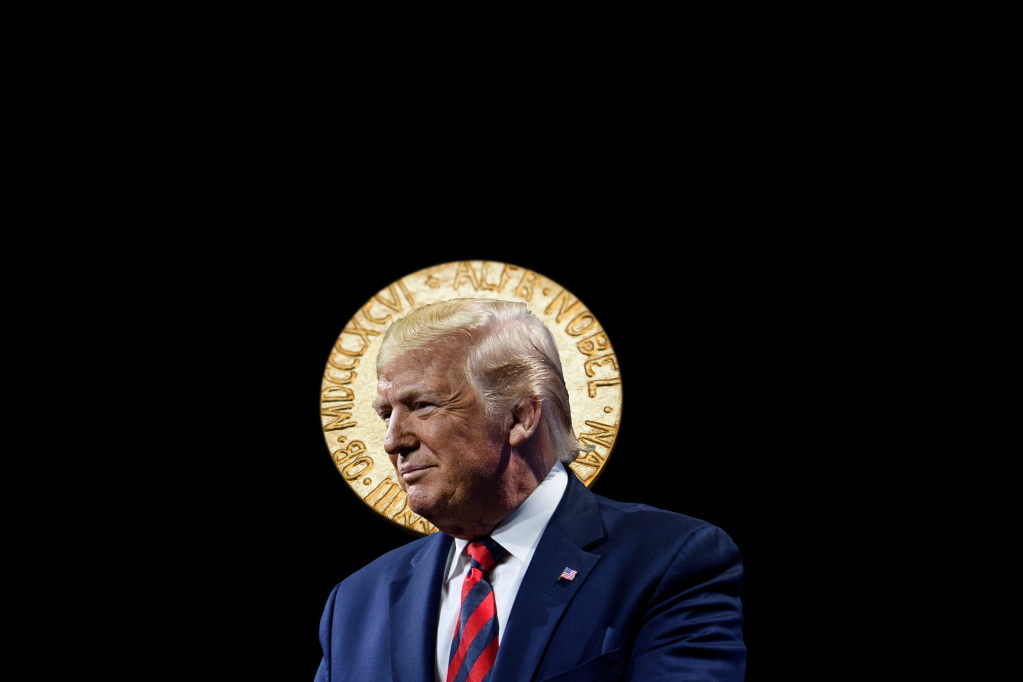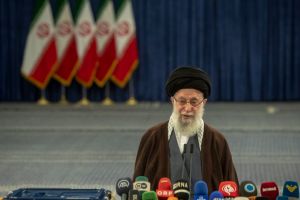Should Donald Trump be awarded the Nobel Peace Prize? So far the President has notched up two nominations in a twist that all but confirms my suspicions that 2020 is being directed by M. Night Shyamalan. We appear to be witnessing a hinge moment in the Middle East, a region that has left successive US presidents battered, bruised and bitter. Now, in the space of two months, Trump has secured agreements from the United Arab Emirates and Bahrain to normalize relations with Israel, with more Arab and Muslim states expected to follow.
True, these alliances have developed over time and are, in part, driven by the common threat of a nuclear Iran, but if we recognize that Trump disregarded decades of bipartisan consensus on the Middle East, we must ask whether that is the reason we are seeing the most positive outcomes in the Middle East for decades. The dreaded question, then, is: what if, somehow, Trump was right?
Of course, Trump can’t be right because the ‘smart people’ — the foreign policy establishment, the academics, the political hacks — said at every juncture that his foreign policy would lead to catastrophe. When Trump withdrew the US from the Iran deal, the smart people called it an act of betrayal on a global scale and said: ‘Few recent presidential decisions have been proved to be so spectacularly wrong in such a short period of time.’ When he took out Iranian terror chief Qasem Soleimani, the smart people called it ‘extreme’ and part of ‘an increasingly dangerous game of chicken’. When he recognized Jerusalem as Israel’s capital and moved the US embassy there, the smart people called it ‘an act of diplomatic vandalism’ and said the President had ‘lit the fuse’ on ‘a ticking time bomb’ and predicted that ‘no one will benefit from it, or at least no one interested in peace’.
When he recognized Israeli sovereignty over the Golan Heights, the smart people said: ‘This is utterly irresponsible, and risks stoking more extremism and instability in the region.’ When his administration recognized Israeli settlements as ‘not per se inconsistent with international law’, the smart people called it an ‘indefensible decision’ which had ‘recklessly sacrificed, at least as long as Trump remains president, the last shreds of the US’s claim to be a broker of a peace’. When he brought forward his peace plan, the smart people termed it ‘a framework that may well have hung a closed-for-the-season sign both on a viable peace process and America’s credibility as a fair and effective broker’.
That’s quite enough from the smart people. Trump broke with their consensus, albeit in an erratic and conflicting way, and now swords are being beaten into plowshares. Kosovo and Serbia are normalizing economic relations, the former is recognizing Israel, the latter is designating Hezbollah a terrorist group; Malawi is opening a diplomatic mission in Jerusalem and Chad is reportedly mulling the same. Iran, which Barack Obama sought to appease with the failed JCPOA, looks increasingly isolated. Not bad for a reality TV star.
Even if these achievements hold up, Trump will likely fall victim to the Reagan paradox. When Ronald Reagan spoke of defeating the ‘Evil Empire’, the smart people said it was impossible; when the Evil Empire fell within a decade, they said it was inevitable and Reagan had nothing to do with it. Trump is not Reagan. Trump does not exist in the same universe as Reagan. Trumpism (if there is such a thing) lacks the moral underpinnings and intellectual coherence of Reaganism and Trump the character and worldview that guided the 40th president. For Reagan, American greatness was Providential and optimistic; for Trump, it is backwards-looking and resentful.
This makes it all the more galling that Trump, a man as unlettered as he is uncouth, has stumbled upon answers to questions that have stumped the smart people for years. The Council on Foreign Relations and the leader page of the FT, the Carnegie Endowment and the Kennedy School of Government, Martin Indyk and Joe Biden — all got it wrong while a vulgar nationalist got it right. A Nobel Peace Prize might seem not only in order but positively poetic.
[special_offer]
The Nobel Committee has a history of doling out the prize as a political downpayment, figuring that a shiny bauble will keep the recipient in line with the Committee’s policy preferences. This doesn’t always work out. Eight months into his presidency, the Committee awarded Obama the Nobel for his ‘vision of and work for a world without nuclear weapons’. Five years later, he cut the non-proliferation budget by 20 percent and increased spending on nukes by 6 percent. Trump seems even less likely to be influenced once the initial bragging rights wear off. Besides, the Nobel hasn’t been all that noble since they gave one to Yasser Arafat.
Whether Trump gets the prize matters less than whether the smart people can bring themselves to learn the lessons of his presidency: that the United States can be an unswerving friend of Israel and an honest broker for peace in the Middle East; that American assertiveness sometimes gets better results than a dozen trilaterals at Camp David; and that a foreign policy elite mired in inertia, unwilling to concede doctrinal failure and talking only to itself can have more limitations than a charlatan rolling the dice. Smart people are essential to foreign policy-making but they need leadership, decisiveness and, every now and then, a spot of dangerous heresy.
Who knows what will be the longer-term consequences of a reorienting Middle East. The United States could be earning itself more and better allies, or it could be making itself less relevant to a new diplomatic bloc. But on the immediate matters of peace, cooperation and strengthening the anti-Iran forces, this president has achieved what the previous one could not and perhaps did not wish to. It sticks in the craw to admit it, but Trump outsmarted the smart people.
This article was originally published on The Spectator’s UK website.


















